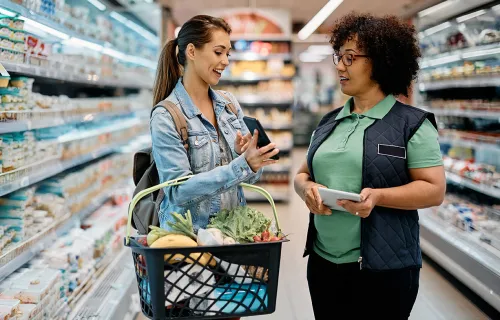As lockdown restrictions ease, restaurants in several countries are gradually resuming indoor and sit-down services. With safety and hygiene a top priority, regular temperature checks, lower restaurant capacity and enhanced sanitization measures are some of the new protocols restaurants are adopting.
In Belgium, contact tracing is one of the requirements for restaurants to resume dine-in services. The objective is to enable public health authorities to rapidly identify and break the chains of transmission in alignment with data protection, security regulations and best practices.
To support re-opening of the hospitality industry in Germany, CGI partnered with Hospitality Digital, a business unit of global wholesale and retail food specialist Metro AG, to develop a solution that enables restaurants to provide health officials with greater access to the information needed to slow the spread of COVID-19.
Using an agile technology-driven approach to bolster contact tracing efforts
Health authorities require restaurants to track guests visiting their establishments. Initially, restaurants used manual paper lists. Although this provided a quick and simple solution for compliance, it raised privacy and hygiene concerns. Personal data was kept on sheets of paper behind the counter while handling paper and pens opened up another possible infection risk.
With the aim of developing a contact tracing solution for the industry, a small team of CGI experts remotely interviewed several restaurant owners to understand their needs and the challenges in implementing COVID-19 guidelines. A week later, the team presented a rapid prototype to Hospitality Digital, which was met with enthusiasm. In the past, CGI has worked with Hospitality Digital to design and deliver new digital solutions that help drive forward digitization and growth of the hospitality industry. (Read the case study.)
Leveraging our client-proximity model and global delivery network, CGI quickly assembled a team of experts speed up development and maximize value. By adopting an agile iterative approach, the team rapidly designed a cloud-hosted Magento-based solution with high security and data privacy measures baked-in. The solution was deployed in two-and-a-half weeks with significant support from CGI’s global technology operations in Leipzig.
Ensuring flexibility to follow localized guidelines and support customer convenience
To enable restaurants to operate within region-specific regulations, the solution incorporates separate rule sets. This includes the duration after which citizen data will be purged based on local data privacy legislation.
Once restaurant owners register for the service, they access a responsive website via a tablet or laptop to configure the restaurant details. Depending on the zip code, the rule sets are adapted to align with local contact tracing rules. Owners then generate a QR code for the entire restaurant or for each table so diners can scan and provide their details. The solution does not require diners to download or install an app; an Internet connection and browser is sufficient. Check-in and check-out times can be provided manually by the diner or pre-set at the backend.
In the event that a diner tests positive for COVID-19, by going through a two-factor authentication process, the restaurant owner can retrieve the details of everyone who may have come into contact with the infected guest and provide this information in a secure manner to public health authorities.
At the time of completing this case study, Hospitality Digital has rolled out the tool within Germany, Italy and Romania, and it is actively being used by close to 1,400 restaurants and increasing steadily.
Reinventing the dining experience to ensure safety comes first
As the pandemic continues to redefine customer behavior, technology plays a pivotal role in helping restaurants reinvent services to meet expectations while keeping employees, customers and communities safe. As part of this solution, CGI experts continue to work with Hospitality Digital to explore a roadmap of enhancements to enable restaurants to minimize the risk of COVID-19 and help customers feel secure.
- Digital menus: To reduce contact between servers and customers, the solution will be expanded to integrate digital menus.
- Online reservation: To limit crowding and follow state-mandated occupancy guidelines, customers will be able to reserve their tables ahead of visiting the restaurant.
- Digital payments: To limit the use of cash and reduce physical contact, diners will be able to pay their bills online via payment gateways or in-chat payment systems.
- Value-added features: To enhance the digital experience, customizations such as customer loyalty programs, bespoke websites, multiple language choices and ecommerce functionalities can be included.
The solution can easily be adapted to other social or business purposes. For instance, other close-contact services, such as tattoo parlors and salons or entertainment and sports venues, such as concert halls and football stadiums can use the tool’s easy and quick registration functionality to facilitate contact tracing.





